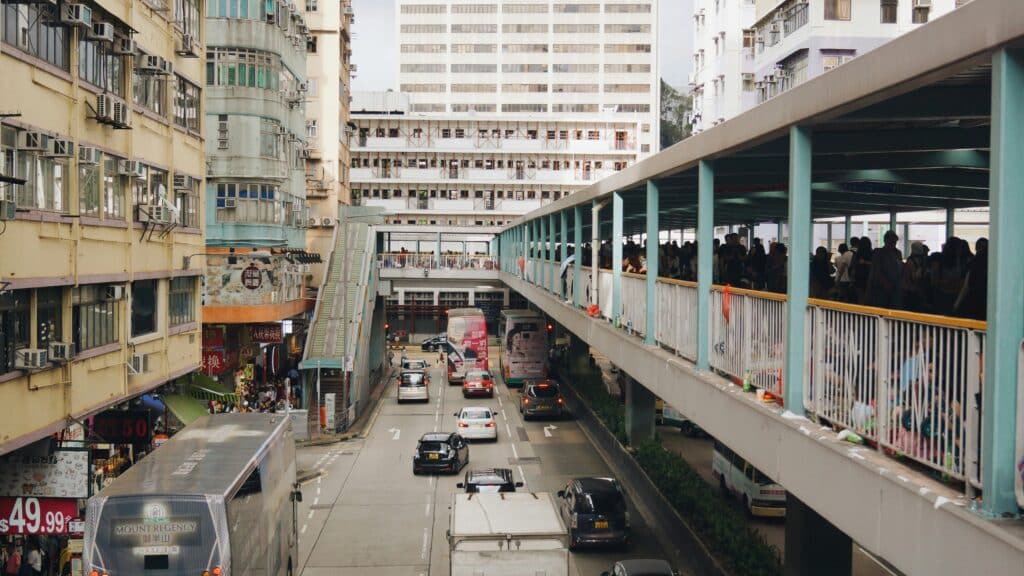Hong Kong, the vibrant hub of the Asian economy, is famous for its towering skyscrapers and cosmopolitan atmosphere. After visiting for business or leisure, many expats choose to settle here. However, before making the move, one key question arises: what is the cost of living in Hong Kong? Foyer Global Health provides a detailed estimate of the average budget required for living in this bustling metropolis.

Overview of the Average Cost of Living in Hong Kong
The average budget needed to live in Hong Kong is among the highest globally. In comparison, the cost of living in Hong Kong is 57.5% higher than many other places in Europe. This budget includes rent, groceries, utilities, transportation, and leisure activities such as dining out or going to the cinema.
| Average Monthly Salary | €3,592 in average |
| Rent for a 1-bedroom apartment in the city center | Between €1,390 and €3,470 |
| Purchase price of an apartment per m² in the city center | €25,500 |
| Petrol (1L) | €2.84 |
| Mobile telecommunications services | Between €7 and €29 |
| Meal for one in a mid-range restaurant | Approximately €27 |
The values above are approximate. Source : Numbeo
Official Currency and Exchange Rate in Hong Kong
Hong Kong is a Special Administrative Region of the People’s Republic of China, with its own legal, political, and monetary systems. The official currency is the Hong Kong dollar (HKD), symbolized as “HK$” and abbreviated as HKD in ISO codes. There is no black market rate. As of September 4, 2024, 1 HKD is equivalent to €0.12, or 8.62 HKD per €1.
Housing Prices in Hong Kong
The starting price for renting a one-bedroom apartment in Hong Kong is HKD 9,000 (€1,039) per month. In the city center, the average rent reaches around HKD 18,000 (€2,080) per month. For expats, renting accommodation is expensive and constitutes the largest monthly expense in Hong Kong.
Buying a property in the city center ranges from HKD 161,450 to 300,000 (€18,600 to €34,665). In the city’s peripheral areas, the average price per m² is between HKD 107,600 and 210,000 (€12,430 to €25,400).
Additionally, some ancillary costs need to be considered in the housing budget, such as energy expenses:
- Electricity (per kWh): HKD 1.47 (€0.17)
- Gas (per kWh): HKD 1.13 (€0.13)
On average, monthly housing costs (electricity, heating, air conditioning, water, and waste management) in Hong Kong are around €245 per apartment. In comparison, the same expenses in China amount to €48.
Average Grocery Budget in Hong Kong
Groceries represent the second-largest expense category for those living in Hong Kong. Food can be quite expensive in the city. Here’s a comparative table of basic food prices in Hong Kong versus China (converted into Euros for easier comparison):
Note: For easier comparison, we have chosen to convert the currencies of each country, i.e. the Hong Kong dollar and the Chinese yuan, into euros.
| Aliment | Prix à Hong Kong | Prix en Chine |
| Rice (1 kg) | €2.12 | €0.88 |
| Eggs (12 pieces) | €3.40 | €1.53 |
| Local cheese (1 kg) | €26.50 | €11.87 |
| Chicken fillets (1 kg) | €8.48 | €3.13 |
| Red meat (1 kg) | €22 | €10.37 |
| Tomatoes (1 kg) | €3.18 | €1.10 |
| Onions (1 kg) | €2.43 | €0.84 |
| Milk (1 liter) | €3 | €1.72 |
| Water (1.5 liters) | €1.44 | €0.51 |
| Local beer (50cl) | €1.94 | €1.57 |
| Imported beer (33cl) | €2.54 | €0.74 |
Transportation Prices in Hong Kong
Hong Kong’s bus network covers almost the entire territory. The average bus ticket price ranges from HKD 4.50 to 47 (€0.52 to €5.43). The city is also served by the MTR (Mass Transit Railway), Hong Kong’s preferred mode of transport, with tickets priced between HKD 4.50 and 14.50 (€0.52 to €1.68).
Taxi fares vary depending on the color of the taxi:
- Red taxis: for urban trips, HKD 29 (€3.35) for the first 2 kilometers.
- Green taxis: for trips to the New Territories, HKD 25.5 (€2.95) for the first 2 kilometers.
- Blue taxis: for trips on Lantau Island, HKD 24 (€2.77) for the first 2 kilometers.
For those driving, fuel costs an average of HKD 24.55 (€2.84) per liter.
Healthcare Budget in Hong Kong
Most healthcare facilities in Hong Kong are equipped with cutting-edge technology. Here are the pricing tiers for services offered by the Hospital Authority (HA) in Hong Kong, divided into three categories:
- Public rates for eligible persons (Hong Kong ID holders or children under 11 residing in Hong Kong)
- Public rates for non-eligible persons
- Private rates
| Service | Eligible persons | Non-Eligibles persons | Rate in private sector |
| General outpatient consultation | HKD 50 (€5.78) | HKD 445 (€51.40) | HKD 640 (€74) |
| Specialist consultation | HKD 135 (€15.60) | HKD 1,190 (€137.50) | Between HKD 680 and 2,780 (€78.50 to €321) |
| Emergency room admission | HKD 180 (€20.80) | HKD 1,230 (€142) | Varies by case |
| First-class hospitalization | HKD 120 (€13.87) | HKD 5,100 (€589) | HKD 6,650 (€768) |
Hong Kong’s healthcare system is a dual system, offering both public and private healthcare services. The public healthcare sector, managed by the Hospital Authority, provides affordable and high-quality care, especially for residents who hold a Hong Kong ID. Public services are highly subsidized, with fees for general outpatient consultations starting as low as HKD 50 (€5.78) for eligible residents. However, the public sector often experiences long wait times, particularly for specialist consultations and non-urgent surgeries, which can range from several months to even years for procedures like joint replacements.
The private healthcare system in Hong Kong offers faster access to specialists and treatments but comes at a higher cost. Many residents opt for private health insurance to cover these expenses, which can vary significantly based on factors like age and pre-existing conditions. The Voluntary Health Insurance Scheme (VHIS) was introduced to regulate private insurance and improve transparency, with policies covering essential treatments such as cancer care, psychiatric services, and diagnostic imaging.
Hong Kong’s healthcare system also places a strong emphasis on primary care, which serves as the first point of contact for most medical needs. The government has been working on reforms to strengthen this area and ensure more coordinated and continuous care at the community level. While the public healthcare sector is affordable and accessible, many expats and wealthier residents choose private care for its shorter wait times and more personalized service, and further international healthcare insurance might be sought out by foreigners and expatriates.
Education Costs in Hong Kong
In Hong Kong, schools teach in Cantonese, Mandarin, and English. Expats can choose to enroll their children in private schools like the International School of Hong Kong. The following are fees for the 2024-2025 school year at the French International School as an example:
- Registration fee: HKD 2,200 (€254)
- Evaluation fee: HKD 1,000 (€115.55)
- Tuition (Kindergarten): HKD 137,824 (€15,925)
- Tuition (Primary School): HKD 140,235 (€16,204)
- Tuition (Secondary School): HKD 163,885 to 200,895 (€18,937 to €23,214)
Telecommunications Services in Hong Kong
Here’s an overview of the average prices for telecommunications services in Hong Kong:
- TV + Internet packages: around HKD 300 (€34.67) per month
- Mobile phone plans (calls + 10GB data): around HKD 146.05 (€16.90) per month
- Internet (60 Mbps or higher, unlimited data): between HKD 100 and 330 (€11.50 to €35) per month.
Leisure Activities in Hong Kong
Hong Kong offers endless opportunities for both daytime and nighttime entertainment. Here are some of the must-do activities along with their prices:
- Peak Tram to Victoria Peak: HKD 52 per person
- Madame Tussauds: HKD 350 for adults, HKD 235 for children
- Hong Kong Disneyland Resort: HKD 639 per day
- Ngong Ping 360 Cable Car: HKD 270 round-trip for adults
- Observation Wheel: HKD 20 for adults, HKD 10 for children and seniors
- OMA Nightclub: HKD 150 per person (entry + one drink)
Living in Hong Kong comes with high costs, particularly in areas such as housing, groceries, and healthcare. However, the city offers world-class amenities, advanced healthcare facilities, and an exciting lifestyle that justifies its price. Whether you are planning a short stay or long-term relocation, budgeting carefully will be crucial to navigating the high cost of living in Hong Kong, this vibrant metropolis.
